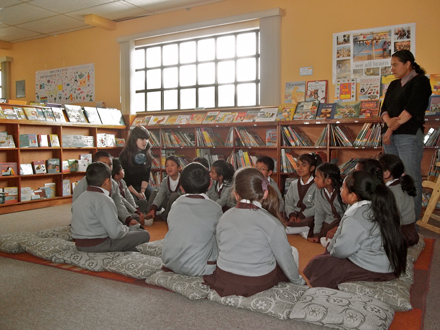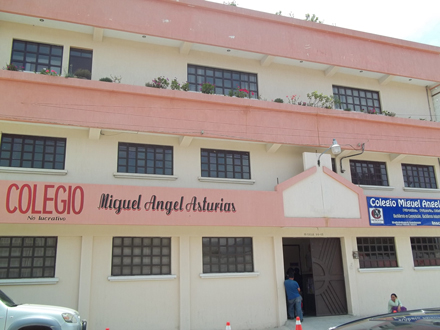
By Carolyne Ménard
This past April, I had the opportunity to travel to Guatemala with Librarians Without Borders (LWB), a non-profit organization dedicated to the promotion of equal access to information resources. Librarians Without Borders has student chapters in many Canadian universities – such as McGill – and its volunteers are either librarianship students or professional librarians. LWB sees libraries as tools for powering development and reducing inequalities in the world by providing information access to everyone, regardless of where they live or what their socioeconomic background is.
Since 2009, LWB has maintained a partnership with the Miguel Angel Asturias Academy, a primary and high school in Quetzaltenango, the second largest city in Guatemala. Founded in 1994, the Miguel Angel Asturias Academy’s goal is to break the poverty cycle in Guatemala by providing an alternative education to its students, based on the pedagogy of Brazilian activist Paulo Freire, author of Pedagogy of the Oppressed.
At the school, students learn and analyze the situation in which they live, they criticize it and they take actions to change it. The school also aims to provide education to social groups often marginalized by the Guatemalan education system: the poor, the women and the indigenous communities. The ultimate goal of the school’s director and founder, Jorge Chojolán, is that the Asturias Academy could implement a social change in Guatemala through the involvement of its students in their community and their will to make their country a more equal place.
Since the Asturias’ curriculum is not identical to the official program of the minister of education, it cannot receive any subventions from the Guatemalan government. To solve this problem, it relies mostly on partnerships with international non-profit organizations, such as LWB. Since the start of its partnership, LWB has been sending participants each year to work in the school’s library. The school’s library offers a nice reading space for students and is very well maintained by the librarians, who are also volunteers. The library was actually built by LWB in 2009, starting with a modest collection of 30 books. Four years later, it now has more than 3,000 books, thanks to donations from individuals, organisations and LWB’s annual trips.
Cultivating a culture of enthusiastic readers
In addition to bringing more books into the library’s collection, the 2013 LWB trip focussed on three projects for the library’s development.
Since the opening of the library, the LWB had planned the implementation of a lending service which would allow students to take books out of the library. So far, the books could only be consulted onsite. The implementation of a lending service in the school’s library involved a lot of tasks for the group, from creating barcodes and student cards, to cataloguing over 100 new books in the library. But it was so great to see how excited the students were when they learned they were going to be able to take the books home with them in a couple of months.

The second project we worked on was creating programming recommendations for the library based on the teachers’ feedback and experiences with it. Since I am fluent in Spanish, I interviewed the teaching staff at the school to get their opinions on the resources available at the library and to find out how it could serve them better in their classes. I really enjoyed getting to talk to the teachers and getting to know their reality and the challenges they had to overcome in their daily work. Plus, the feedback I received from them about the library was very positive. I was pleased to find out that the entire teaching staff uses and values the library’s resources in their class. They were very aware of how important it is for students to read and to understand what they read, and they confirmed us that many students developed a profound love of reading throughout the past four years.
Finally, while we were at the school, we planned and organised “Library Day,” a day during which every student group and grade would come to the library to participate in activities related to libraries and books. For example, with the younger students, we had a storytelling activity and a creation of bookmarks activity, while for older students we had a scavenger hunt and a book buffet activity. The day was a success and students really enjoyed themselves. On a personal note, I was very impressed to see that no one complained about having to participate in the activities, especially with the older students, as it can often be the case with teenagers. The level of appreciation of our efforts from the students really moved me.
Fulfilling experience on different levels
Overall, my experience with Librarians Without Borders in Guatemala was incredibly fulfilling, both on a professional and personal level.
Professionally, it was a great opportunity to put in practice some of the theory I learned at the McGill School of Information Studies, from cataloguing to programming for the library. I was amazed to see the importance of the library and of reading activities in the educational project of Asturias. The staff really understood the importance of providing its students with adequate information resources to enhance their analytical and critical skills. This is even more impressive when we consider the situation of libraries and information access in Guatemala, where libraries lack resources and normally retain all their books behind the counter, which restrains their free use. I also found it amazing that the school’s curriculum discussed many issues related to the contemporary history of the country, such as corruption or human rights violations, and that the library included many books on these topics as well.
On a personal level, I am very happy I had the chance to get to know the Miguel Angel Asturias Academy, its teachers and its students. The unique curriculum of the school inspired me and showed me once again how education can be a powerful tool for change and social justice.
Guatemala is still struggling with high levels of violence and poverty, having suffered a long civil war of thirty-six years (1960-1996) during which many massacres of indigenous communities occurred. The country is characterized by an unequal distribution of wealth, where the richest 20 per cent of the population account for nearly 80 per cent of agricultural land. The education system also experiences many challenges: the average age of dropout is 11 years, and 35 per cent of students do not complete primary school. Only 40 per cent of those who complete it then continue to high school. Knowing all this, I found the educational project of Asturias Academy even more inspiring and I hope it achieves its goal of implementing change in Guatemala.
Working with LWB was an amazing experience which definitely made me want to seek more opportunities in the future to work in regions where access to information is not a given. As North Americans, we tend to take for granted our wide access to information resources. Borrowing books in a library is something we don’t really think about and we often forget how incredible all the knowledge we can get within our reach is. This situation that we take for granted is something people wish for and fight for in other regions of the world, as it is the case in Guatemala. Keeping this in mind, I feel that working to make information access more equal in the world is the least I can do.
When our group left Quetzaltenango, Jorge Chojolán thanked us all for our work and mentioned that the school got a lot out of our work. But I do think our group received so much as well; on a personal note, I bring back home more memories, experiences and insights that I could have imagined.
For more information or to donate to Librarians Without Borders or to the Miguel Angel Asturias Academy click here.
Carolyne Ménard is currently undertaking a master’s degree in Library and Information Studies at the McGill School of Information Studies. She is the 2013-2014 co-chair of the McGill Chapter of Librarians Without Borders.
Notes from the Field are first-person accounts written by researchers or interns that give readers a glimpse of what life is like in the field, be it in an exotic location or just down the road. If you are doing fieldwork, research or an internship this summer and would like to tell the McGill community about your experiences contact Neale McDevitt for more details.

Great article!